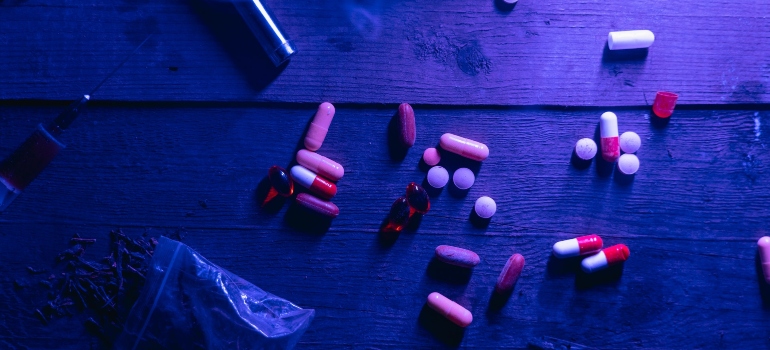One of the ways people often cope with the negative effects of toxic relationships is through substance abuse. Alcohol and drug addiction can provide temporary relief from the pain and stress of a toxic relationship, but ultimately, they only make the situation worse. If you find this situation relatable, then it’s time to recognize ways toxic relationships influence addiction. Seek help and prioritize your health and well-being. You can contact us at Harmony Ridge Recovery Center WV for additional information about treatments designed to help you break free from addictive habits and take steps towards a healthier life and future.
Common Signs of a Toxic Relationship
A toxic relationship can take many forms, and the signs can be difficult to recognize, especially if you’ve been in the relationship for a long time. Therefore, it’s crucial to pay attention to your feelings and listen to your instincts, as they can often give you a sense of when something is not right.

Constant arguments
One common sign of a toxic relationship is frequent arguments or conflicts that never seem to get resolved. This can be a sign that there is a lack of communication or mutual understanding in the relationship. It may also indicate that one or both partners are unwilling to compromise or find common ground.
A pattern of criticism
Another common sign is a pattern of criticism, belittling, or put-downs from your partner. This can wear down your self-esteem and make you feel insecure or unworthy. It can also create a power dynamic in which your partner holds all the control and leaves you feeling helpless
Controlling behavior
Controlling behavior frequently manifests in toxic relationships. It takes many forms, such as monitoring your movements, checking your phone or email, or trying to limit your contact with friends and family. It can make you feel like you’re being suffocated or trapped, and it can also isolate you from sources of support and comfort.
Gaslighting and emotional manipulation
Emotional manipulation or gaslighting is another common sign of a toxic relationship. Gaslighting is a tactic in which your partner tries to make you doubt your perceptions or memories. This can make you feel like you’re going crazy or losing your mind, and it can be a highly effective form of psychological abuse.
Jealousy
While some jealousy is normal in any relationship, excessive jealousy or possessiveness can be a sign of insecurity or a lack of trust. This can lead to accusations of cheating or infidelity, even when there is no evidence to support these claims.
Physical violence
Finally, physical violence or threats of violence are clear indications that the relationship has become dangerous and requires immediate intervention.
Physical violence refers to the use of force or aggression that results in bodily harm or injury. It can take many forms, such as hitting, slapping, kicking, punching, choking, or any other physical act intended to cause harm. Threats of violence, where a person expresses an intent to harm someone physically, can also be considered a form of physical violence.
Physical violence is a serious concern in any relationship, and it is an indication that the relationship has become dangerous and potentially life-threatening. Victims of physical violence can suffer from physical injuries, emotional trauma, and long-term psychological damage.
It is important to recognize the signs of physical violence and seek help immediately if you or someone you know is experiencing it. This may involve reaching out to a trusted friend or family member, seeking support from a domestic violence hotline or counseling service, or involving law enforcement if necessary. It is crucial to take action to ensure the safety and well-being of everyone involved.
Toxic Relationships and Addiction
A toxic relationship is characterized by one or both partners engaging in unhealthy behaviors, such as manipulation, control, or verbal and physical abuse. These behaviors can cause significant damage to your self-esteem and confidence, leading to anxiety, depression, and even PTSD in severe cases.

When you are in a toxic relationship, you may feel trapped and hopeless, and turning to substances like alcohol or drugs can seem like a way to escape the pain. However, using harmful substances as a coping mechanism can quickly spiral out of control, leading to addiction and a whole new set of problems.
The Cycle of Addiction and Toxic Relationships
Substance abuse and toxic relationships are interconnected since they can both be forms of escapism. When you are in a toxic relationship, you may feel trapped and powerless, and using drugs or alcohol can provide a temporary sense of relief. Similarly, addiction can provide a sense of escape from the challenges of everyday life, including toxic relationships.
However, this temporary relief can quickly turn into a vicious cycle. Substance abuse can lead to a range of behaviors that can make the relationship more toxic. For example, if you are using drugs or alcohol, you may become more irritable, argumentative, or aggressive, which can escalate conflicts with your partner. This can, in turn, increase the level of toxicity in the relationship, leading to even more substance abuse as a way to cope.
Furthermore, addiction can exacerbate many mental health conditions that are common in toxic relationships, such as anxiety and depression. This can make it even harder to break free from the cycle of addiction and toxicity. For example, if you have low self-esteem, you may turn to drugs or alcohol as a way to feel better about yourself, but this can lead to addiction, which can further erode your self-esteem.
The Link Between Toxic Relationships and Substance Abuse
The connection between toxic relationships and substance abuse is well documented. Studies have shown that people in toxic relationships are more likely to use drugs and alcohol than those in healthy relationships. The reasons for this are complex and multifaceted.

One reason is that people in toxic relationships often feel isolated and alone. They may not have anyone to turn to for support, which can make them more likely to turn to substances as a way to cope. Additionally, toxic relationships can cause significant stress and anxiety, which can lead to substance abuse as a way to self-medicate. Another reason is that people in toxic relationships may feel like they have lost control of their lives. Substance abuse can provide a sense of control and escape, even if it is only temporary. This can be particularly true for people who have experienced trauma or abuse in their past.
How Codependency Continues Toxic Relationships and Addiction
Codependency is a term used to describe a pattern of behavior in which a person becomes overly dependent on their partner, often to the point of neglecting their own needs and desires. This type of behavior is often seen in toxic relationships, where one partner is controlling and manipulative, and the other partner feels trapped and unable to leave. Codependency can also contribute to addiction, as the individual may turn to substance abuse as a way to cope with their feelings of powerlessness and lack of control.
Enabling Behaviors
Codependency can manifest in a variety of ways, including enabling behaviors such as:
- Ignoring or minimizing problems caused by addiction.
- Making excuses for the addict’s behavior.
- Taking on responsibilities that the addict should handle.
- Putting the addict’s needs before your own.
- Avoiding confrontation or difficult conversations.
- Trying to control the addict’s behavior.
Contributing Factors
Codependency can develop due to a variety of contributing factors, including:
- Childhood trauma or neglect
- Low self-esteem
- Fear of abandonment
- Need for control
- Family history of addiction or codependency
- Lack of healthy boundaries
Breaking the Cycle
Breaking the cycle of codependency requires a combination of therapy and support from others. Therapy can help individuals identify and address underlying issues that contribute to codependent behavior. Support groups can also provide a safe space for individuals to connect with others who have experienced similar struggles and offer guidance on healthy coping mechanisms. Therefore, make sure to seek a rehab center Clarksburg WV locals trust the most, which also provides all the necessary resources.

Toxic Relationships Influence Addiction and Addiction Recovery
The impact of a toxic relationship on addiction recovery can be significant and can have negative effects on the person’s well-being. Here are some ways in which a toxic relationship can affect addiction recovery:
- Triggering of cravings: Being in a toxic relationship can lead to stress and anxiety, which can be triggering for individuals in recovery. This can lead to an increase in cravings and a higher risk of relapse.
- Lack of support: In a healthy relationship, partners are supportive of each other’s goals and ambitions. However, in a toxic relationship, the opposite is true. Your partner may not support your recovery and may even try to sabotage your progress.
- Emotional instability: Toxic relationships are often characterized by emotional instability, which can be detrimental to addiction recovery. You may find it difficult to regulate your emotions, which can make it harder to cope with the challenges of recovery.
- Negative self-image: Being in a toxic relationship can lead to a negative self-image, which can be damaging to addiction recovery. You may feel unworthy of recovery or believe that you don’t deserve to be happy.
- Increased stress: Toxic relationships can be very stressful, which can impact addiction recovery negatively. You may find it difficult to focus on your recovery when you are dealing with the stress of your relationship.

How To Look For the Right Treatment Center
Finding the right rehab center is crucial for those seeking addiction recovery. Choosing the right facility can mean the difference between a successful recovery and a relapse. Here are some key considerations to keep in mind when looking for a proper rehab center:
- Treatment programs offered: Each rehab center has its own unique approach to addiction treatment, so it’s important to find one that offers the programs and therapies that best suit your needs. Look for a facility that offers a wide range of treatment options, such as medical detox, individual therapy, alcohol rehab for veterans, aftercare planning, etc.
- Staff qualifications and experience: The qualifications and experience of the staff at fentanyl rehab centers can greatly impact the quality of care you receive. Look for a rehab center with licensed and experienced professionals, such as psychiatrists, therapists, and addiction specialists.
- Facilities and amenities: The environment of the rehab center Cambridge OH can play a significant role in recovery. Look for a facility with comfortable living quarters, exercise equipment, recreational activities, and other amenities that can make the recovery experience more enjoyable.
- Location and accessibility: The location of the rehab center is also important. Consider factors such as proximity to family and friends, the ease of travel, and whether the facility is located in a peaceful environment away from triggers and temptations.
- Insurance: Make sure to look for drug rehab that accepts Tricare, and other major insurance policies you might qualify for.
Rehab Can Help You Get Your Life Back and Exit Toxic Relationships
Rehabilitation centers offer several evidence-based treatments that help you break free from the addiction cycle and exit a toxic relationship.

Below are some of the most effective treatments that are included in drug rehab in Huntington WV:
- Cognitive Behavioral Therapy (CBT): CBT is a form of therapy that helps you recognize negative thought patterns and behaviors that contribute to addiction and toxic relationships. It helps you develop coping mechanisms to deal with stress and challenging situations. Furthermore, it might change the way you perceive relationships and therefore help you abandon toxic patterns.
- Dialectical Behavior Therapy (DBT): DBT is a type of therapy that teaches you how to regulate your emotions and improve relationships. It is especially effective for individuals struggling with addiction and co-occurring disorders like borderline personality disorder, depression, or anxiety. It’s an important part of Ambien rehab in WV, and other treatments.
- Medication-assisted treatment (MAT): MAT is a treatment approach that combines medication with therapy and counseling to address substance use disorders. Medications like Methadone, Buprenorphine, or Naltrexone can help reduce withdrawal symptoms and cravings, making it easier to stay sober.
- Group therapy: Through group therapy for addiction, you can connect with others who are also in recovery. It can help you learn from others and provide a sense of community and support.
- Family therapy: Addiction and toxic relationships can impact not only the individual but also their loved ones. Family therapy can help rebuild relationships and address any underlying issues that contribute to the addiction or toxic relationship.
Toxic Relationships Influence Addiction—Let Us Help You Deal With Them
It’s crucial to recognize the ways toxic relationships influence addiction in order to take steps toward recovery. The next step is seeking help at the right rehab center that can provide you with various treatments, including therapy and support groups, to help you break free from the cycle of addiction and exit toxic relationships. Remember, seeking help is not a sign of weakness but a courageous act toward a better future. With the right support and resources, you can regain control of your life and start building healthy relationships. Don’t hesitate to reach out and seek help as soon as possible.



